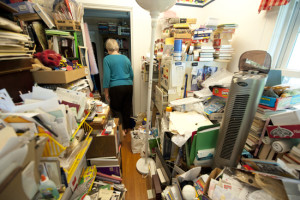 If you have a loved on who collects everything, fears throwing items away and has a home that is so piled with stuff that it’s hard to find a pathway to walk through, you may be wondering what type of psychologist helps someone with a hoarding disorder. Likely, once it’s gotten to this point, you’ve realized that the time has come for an intervention, but you may not be sure where to start. Fortunately, there have been great strides in the treatment of hoarding problems over the past few years.
If you have a loved on who collects everything, fears throwing items away and has a home that is so piled with stuff that it’s hard to find a pathway to walk through, you may be wondering what type of psychologist helps someone with a hoarding disorder. Likely, once it’s gotten to this point, you’ve realized that the time has come for an intervention, but you may not be sure where to start. Fortunately, there have been great strides in the treatment of hoarding problems over the past few years.
About Hoarding
Those who are diagnosed with a hoarding disorder have an extreme difficulty parting with possessions and often collect things to the point that it significantly disrupts their lives. The items they resist parting with are often things their families and friends consider to be junk. This obsession can cause problems and strife among family members. In fact, it’s often the case that adult children of hoarders will say that the parent’s hoarding of possessions made them feel that the stuff was more important than the children themselves.
People who hoard are very attached to their objects, and it causes them great strife to part with them. Often, their homes are so filled with things that most areas become unusable. They may not be able to cook in their kitchen or sleep in their bed. Extreme hoarding can cause health and safety hazards. Often, a home gets to point of such disrepair and filth that it becomes infested with pests. The excessive clutter makes it difficult for emergency personnel to enter should the home’s occupant fall ill or have an accident. Hoarding is a very serious issue.
Hoarders are most often middle aged adults, but tendencies for collecting frequently begin as children or teens. These people face a great deal of stress because they may realize that the hoarding has become a problem in their lives, but the anxiety and discomfort when faced with purging their stuff outweighs their logic.
Help for Hoarders
Fortunately, in 2013, hoarding disorder was defined as a mental disorder in the 5th edition of the Diagnostic and Statistical Manual of Mental Disorders (DSM). This gave the condition more legitimacy, spurring additional research on its treatment. There are a number of mental health professionals that work with those diagnosed with a hoarding disorder. Beyond clinical psychologists,you’ll find that psychiatrists, social workers and even professional organizers are often sought to aid in treatment. Additionally, there are organizations that train psychologists and other mental health professionals to become experts in treating hoarding disorders and Hoarding Specialist Certificates can be earned.
Treatment Methods
Hoarding is a very complicated disorder, and sufferers can be resistant to treatment. There are medicines that have been shown to help somewhat with hoarding related to OCD or obsessive compulsive disorder, but they aren’t always effective. Cognitive behavioral therapy (CBT), combined with counseling, is a therapeutic approach that has probably gained the most success in helping hoarders to gain control of their lives. This therapeutic style focuses on confronting unhealthy thinking and behaviors, learning new, more acceptable methods. Through CBT, hoarders can discover the reason for their hoarding, develop organizational and decision making skills, practice relaxation skills and work with a professional to get through the decluttering process.
As you can see, a hoarder’s life is severely impacted in many ways. However, there are therapies and mental health professionals like a psychologist to help someone with a hoarding disorder.





